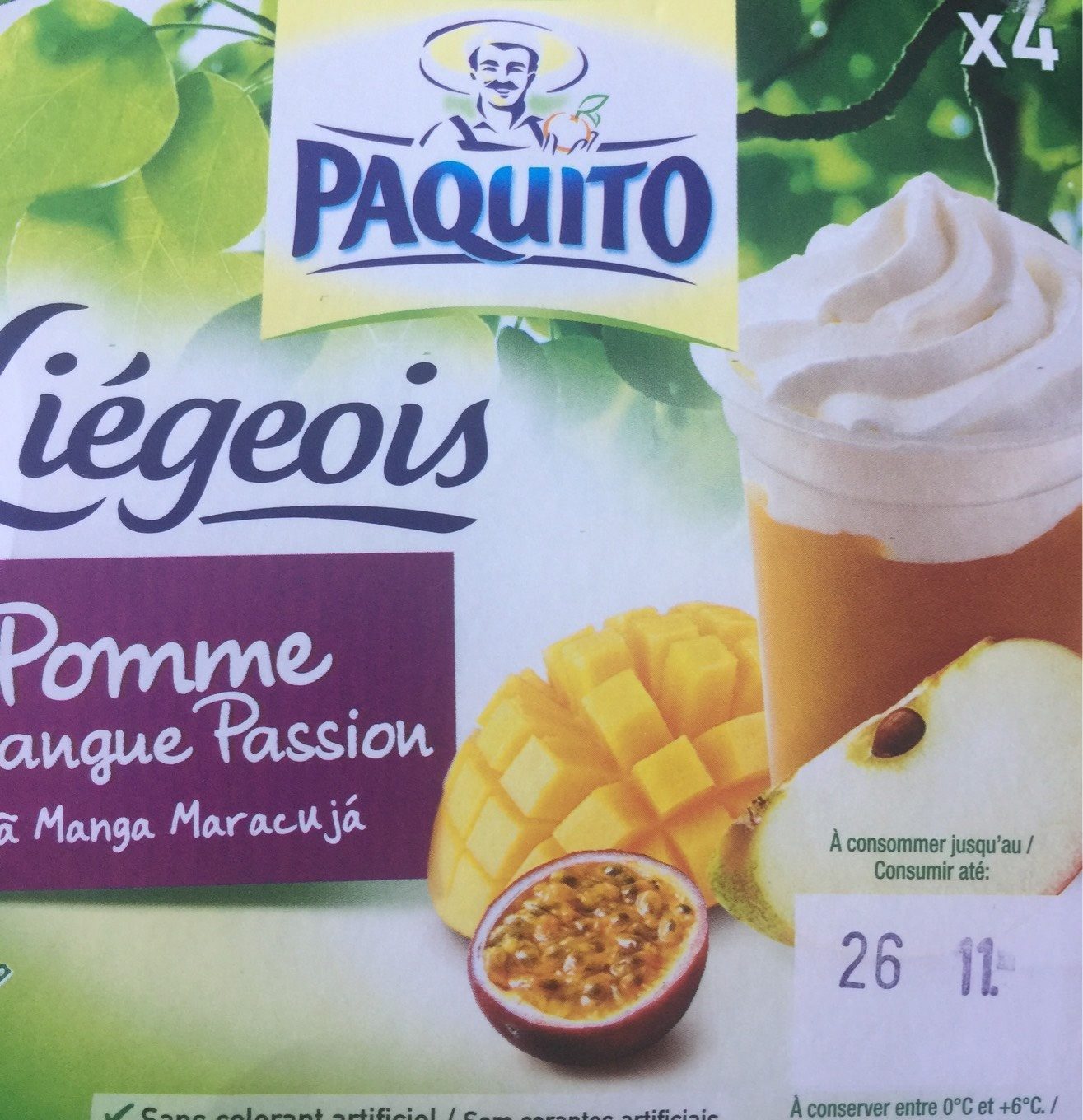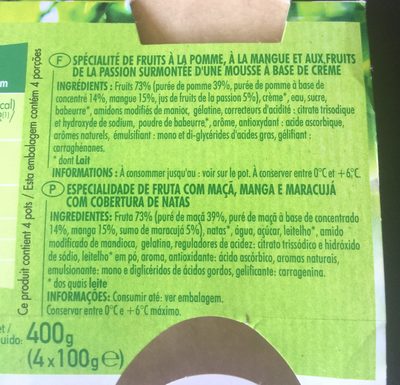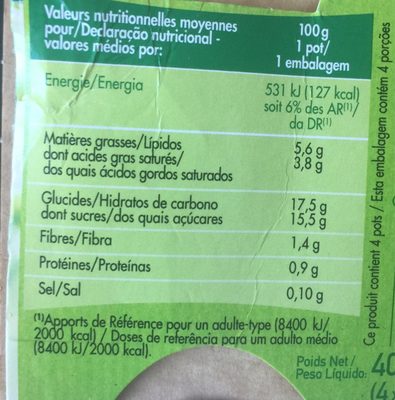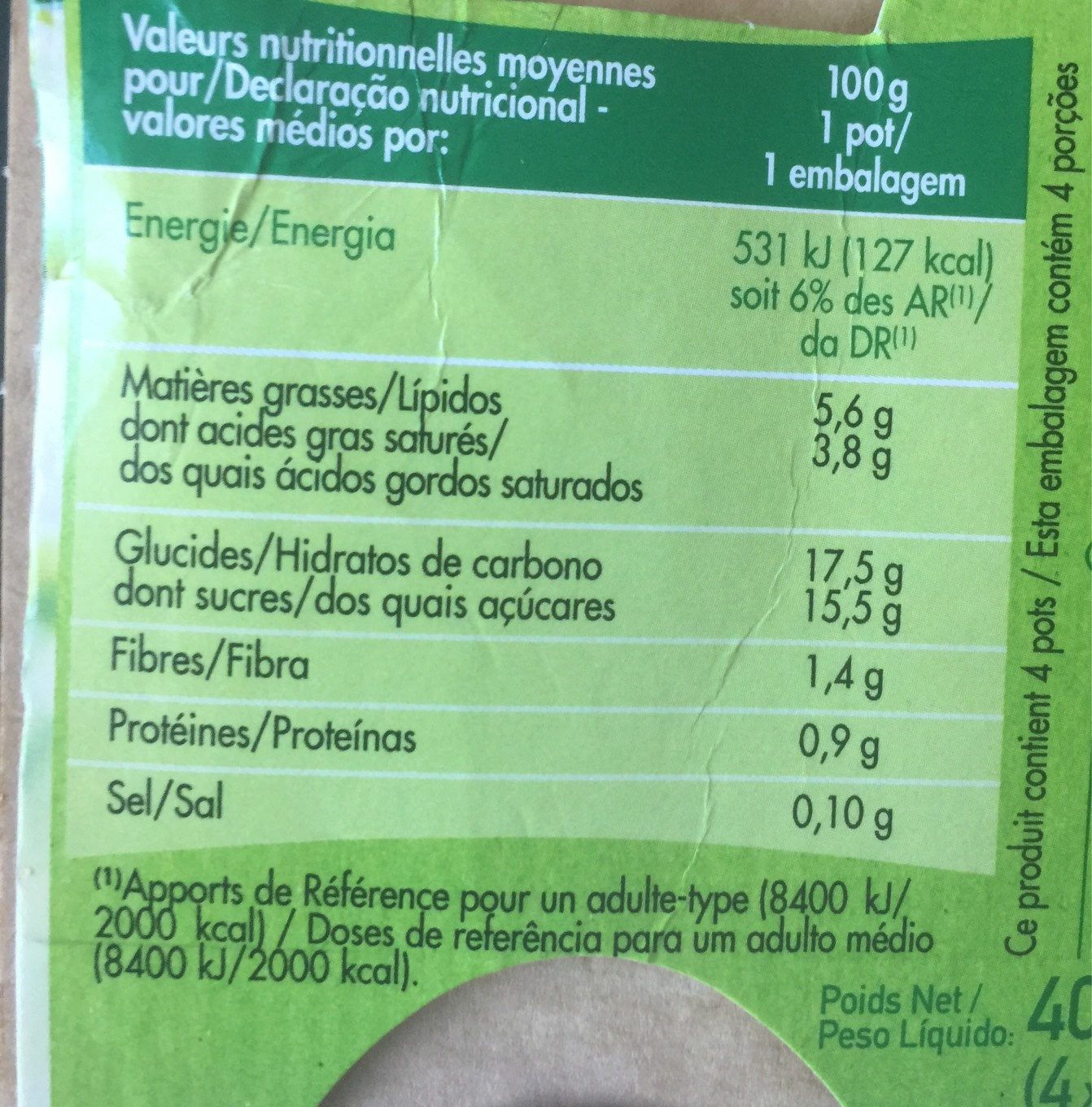Help us make food transparency the norm!
As a non-profit organization, we depend on your donations to continue informing consumers around the world about what they eat.
The food revolution starts with you!
Liégeois pomme mangue passion 4 x 100 g - Paquito - 400 g
Liégeois pomme mangue passion 4 x 100 g - Paquito - 400 g
Important note: this product is no longer sold. The data is kept for reference only. This product does not appear in regular searches and is not taken into account for statistics.
This product page is not complete. You can help to complete it by editing it and adding more data from the photos we have, or by taking more photos using the app for Android or iPhone/iPad. Thank you!
×
Some of the data for this product has been provided directly by the manufacturer INTERMARCHÉ.
Barcode: 3250391996094 (EAN / EAN-13)
Quantity: 400 g
Brands: Paquito
Categories: Dairies, Desserts, Dairy desserts, Liégeois
Stores: Intermarché
Countries where sold: France
Matching with your preferences
Health
Ingredients
-
24 ingredients
French: Fruits 73% (purée de pomme 39%, purée de pomme à base de concentré 14%, mangue 15%, jus de fruits de la passion 5%), crème*, eau, sucre, babeurre*, amidons modifiés de manioc, gélatine, correcteurs d'acidité : citrate trisodique et hydroxyde de sodium, poudre de babeurre*, arôme, antioxydant : acide ascorbique, arômes naturels, émulsifiant : mono et di-glycérides d'acides gras, gélifiant : carraghénanes. * dont _ LaitAllergens: Milk
Food processing
-
Ultra processed foods
Elements that indicate the product is in the 4 - Ultra processed food and drink products group:
- Additive: E14XX - Modified Starch
- Additive: E407 - Carrageenan
- Additive: E428 - Gelatine
- Additive: E471 - Mono- and diglycerides of fatty acids
- Ingredient: Emulsifier
- Ingredient: Flavouring
- Ingredient: Gelling agent
Food products are classified into 4 groups according to their degree of processing:
- Unprocessed or minimally processed foods
- Processed culinary ingredients
- Processed foods
- Ultra processed foods
The determination of the group is based on the category of the product and on the ingredients it contains.
Additives
-
E331 - Sodium citrates
Sodium citrate: Sodium citrate may refer to any of the sodium salts of citrate -though most commonly the third-: Monosodium citrate Disodium citrate Trisodium citrateThe three forms of the salt are collectively known by the E number E331. Sodium citrates are used as acidity regulators in food and drinks, and also as emulsifiers for oils. They enable cheeses to melt without becoming greasy.Source: Wikipedia
-
E331iii - Trisodium citrate
Sodium citrate: Sodium citrate may refer to any of the sodium salts of citrate -though most commonly the third-: Monosodium citrate Disodium citrate Trisodium citrateThe three forms of the salt are collectively known by the E number E331. Sodium citrates are used as acidity regulators in food and drinks, and also as emulsifiers for oils. They enable cheeses to melt without becoming greasy.Source: Wikipedia
-
E407 - Carrageenan
Carrageenan (E407), derived from red seaweed, is widely employed in the food industry as a gelling, thickening, and stabilizing agent, notably in dairy and meat products.
It can exist in various forms, each imparting distinct textural properties to food.
However, its degraded form, often referred to as poligeenan, has raised health concerns due to its potential inflammatory effects and its classification as a possible human carcinogen (Group 2B) by the International Agency for Research on Cancer (IARC).
Nevertheless, food-grade carrageenan has been deemed safe by various regulatory bodies when consumed in amounts typically found in food.
-
E471 - Mono- and diglycerides of fatty acids
Mono- and diglycerides of fatty acids (E471), are food additives commonly used as emulsifiers in various processed foods.
These compounds consist of glycerol molecules linked to one or two fatty acid chains, which help stabilize and blend water and oil-based ingredients. E471 enhances the texture and shelf life of products like margarine, baked goods, and ice cream, ensuring a smooth and consistent texture.
It is generally considered safe for consumption within established regulatory limits.
-
E524 - Sodium hydroxide
Sodium hydroxide: Sodium hydroxide, also known as lye and caustic soda, is an inorganic compound with the formula NaOH. It is a white solid ionic compound consisting of sodium cations Na+ and hydroxide anions OH−. Sodium hydroxide is a highly caustic base and alkali that decomposes proteins at ordinary ambient temperatures and may cause severe chemical burns. It is highly soluble in water, and readily absorbs moisture and carbon dioxide from the air. It forms a series of hydrates NaOH·nH2O. The monohydrate NaOH·H2O crystallizes from water solutions between 12.3 and 61.8 °C. The commercially available "sodium hydroxide" is often this monohydrate, and published data may refer to it instead of the anhydrous compound. As one of the simplest hydroxides, it is frequently utilized alongside neutral water and acidic hydrochloric acid to demonstrate the pH scale to chemistry students.Sodium hydroxide is used in many industries: in the manufacture of pulp and paper, textiles, drinking water, soaps and detergents, and as a drain cleaner. Worldwide production in 2004 was approximately 60 million tonnes, while demand was 51 million tonnes.Source: Wikipedia
Ingredients analysis
-
May contain palm oil
Ingredients that may contain palm oil: E471
-
Non-vegan
Non-vegan ingredients: Cream, Buttermilk, E428, Buttermilk, Milk
-
Non-vegetarian
Non-vegetarian ingredients: E428
-
Details of the analysis of the ingredients
fr: Fruits 73% (purée de pomme, purée de pomme, mangue, fruits de la passion), crème, eau, sucre, babeurre, amidons modifiés de manioc, gélatine, correcteurs d'acidité (citrate trisodique, hydroxyde de sodium), babeurre, arôme, antioxydant (acide ascorbique), arômes naturels, émulsifiant (mono- et diglycérides d'acides gras), gélifiant (carraghénanes, dont _ Lait)- Fruits -> en:fruit - vegan: yes - vegetarian: yes - percent_min: 73 - percent: 73 - percent_max: 52.56
- purée de pomme -> en:apple-puree - vegan: maybe - vegetarian: maybe - ciqual_food_code: 13050 - percent_min: 28.47 - percent_max: 28.08
- purée de pomme -> en:apple-puree - vegan: maybe - vegetarian: maybe - ciqual_food_code: 13050 - percent_min: 10.22 - percent_max: 10.08
- mangue -> en:mango - vegan: yes - vegetarian: yes - percent_min: 10.95 - percent_max: 10.8
- fruits de la passion -> en:passionfruit - vegan: yes - vegetarian: yes - ciqual_food_code: 13016 - percent_min: 3.65 - percent_max: 3.6
- crème -> en:cream - vegan: no - vegetarian: yes - ciqual_food_code: 19402 - percent_min: 2.07692307692308 - percent_max: 27
- eau -> en:water - vegan: yes - vegetarian: yes - ciqual_food_code: 18066 - percent_min: 0 - percent_max: 24.9230769230769
- sucre -> en:sugar - vegan: yes - vegetarian: yes - ciqual_proxy_food_code: 31016 - percent_min: 0 - percent_max: 12.4615384615385
- babeurre -> en:buttermilk - vegan: no - vegetarian: yes - ciqual_food_code: 19801 - percent_min: 0 - percent_max: 8.30769230769231
- amidons modifiés de manioc -> en:modified-tapioca-starch - vegan: yes - vegetarian: yes - percent_min: 0 - percent_max: 6.23076923076923
- gélatine -> en:e428 - vegan: no - vegetarian: no - percent_min: 0 - percent_max: 4.98461538461538
- correcteurs d'acidité -> en:acidity-regulator - percent_min: 0 - percent_max: 4.15384615384615
- citrate trisodique -> en:sodium-citrate - percent_min: 0 - percent_max: 4.15384615384615
- hydroxyde de sodium -> en:e524 - vegan: yes - vegetarian: yes - percent_min: 0 - percent_max: 2.07692307692308
- babeurre -> en:buttermilk - vegan: no - vegetarian: yes - ciqual_food_code: 19801 - percent_min: 0 - percent_max: 3.56043956043956
- arôme -> en:flavouring - vegan: maybe - vegetarian: maybe - percent_min: 0 - percent_max: 3.11538461538461
- antioxydant -> en:antioxidant - percent_min: 0 - percent_max: 2.76923076923077
- acide ascorbique -> en:e300 - vegan: yes - vegetarian: yes - percent_min: 0 - percent_max: 2.76923076923077
- arômes naturels -> en:natural-flavouring - vegan: maybe - vegetarian: maybe - percent_min: 0 - percent_max: 2.49230769230769
- émulsifiant -> en:emulsifier - percent_min: 0 - percent_max: 2.26573426573427
- mono- et diglycérides d'acides gras -> en:e471 - vegan: maybe - vegetarian: maybe - from_palm_oil: maybe - percent_min: 0 - percent_max: 2.26573426573427
- gélifiant -> en:gelling-agent - percent_min: 0 - percent_max: 2.07692307692308
- carraghénanes -> en:e407 - vegan: yes - vegetarian: yes - percent_min: 0 - percent_max: 2.07692307692308
- dont _ Lait -> en:milk - vegan: no - vegetarian: yes - percent_min: 0 - percent_max: 1.03846153846154
- Fruits -> en:fruit - vegan: yes - vegetarian: yes - percent_min: 73 - percent: 73 - percent_max: 52.56
Nutrition
-
Average nutritional quality
⚠ ️Warning: the amount of fruits, vegetables and nuts is not specified on the label, it was estimated from the list of ingredients: 73This product is not considered a beverage for the calculation of the Nutri-Score.
Positive points: 3
- Proteins: 0 / 5 (value: 0.9, rounded value: 0.9)
- Fiber: 1 / 5 (value: 1.9, rounded value: 1.9)
- Fruits, vegetables, nuts, and colza/walnut/olive oils: 2 / 5 (value: 73, rounded value: 73)
Negative points: 7
- Energy: 1 / 10 (value: 516, rounded value: 516)
- Sugars: 3 / 10 (value: 15.5, rounded value: 15.5)
- Saturated fat: 3 / 10 (value: 3.8, rounded value: 3.8)
- Sodium: 0 / 10 (value: 40, rounded value: 40)
The points for proteins are counted because the negative points are less than 11.
Nutritional score: (7 - 3)
Nutri-Score:
-
Nutrient levels
-
Fat in moderate quantity (5.6%)
What you need to know- A high consumption of fat, especially saturated fats, can raise cholesterol, which increases the risk of heart diseases.
Recommendation: Limit the consumption of fat and saturated fat- Choose products with lower fat and saturated fat content.
-
Saturated fat in moderate quantity (3.8%)
What you need to know- A high consumption of fat, especially saturated fats, can raise cholesterol, which increases the risk of heart diseases.
Recommendation: Limit the consumption of fat and saturated fat- Choose products with lower fat and saturated fat content.
-
Sugars in high quantity (15.5%)
What you need to know- A high consumption of sugar can cause weight gain and tooth decay. It also augments the risk of type 2 diabetes and cardio-vascular diseases.
Recommendation: Limit the consumption of sugar and sugary drinks- Sugary drinks (such as sodas, fruit beverages, and fruit juices and nectars) should be limited as much as possible (no more than 1 glass a day).
- Choose products with lower sugar content and reduce the consumption of products with added sugars.
-
Salt in low quantity (0.1%)
What you need to know- A high consumption of salt (or sodium) can cause raised blood pressure, which can increase the risk of heart disease and stroke.
- Many people who have high blood pressure do not know it, as there are often no symptoms.
- Most people consume too much salt (on average 9 to 12 grams per day), around twice the recommended maximum level of intake.
Recommendation: Limit the consumption of salt and salted food- Reduce the quantity of salt used when cooking, and don't salt again at the table.
- Limit the consumption of salty snacks and choose products with lower salt content.
-
-
Nutrition facts
Nutrition facts As sold
for 100 g / 100 mlCompared to: Liégeois Energy 516 kj
(127 kcal)-21% Fat 5.6 g -26% Saturated fat 3.8 g -24% Carbohydrates 17.5 g -3% Sugars 15.5 g -2% Fiber 1.9 g +242% Proteins 0.9 g -69% Salt 0.1 g -28% Fruits‚ vegetables‚ nuts and rapeseed‚ walnut and olive oils (estimate from ingredients list analysis) 73 %
Environment
-
Eco-Score C - Moderate environmental impact
⚠ ️Select a country in order to include the full impact of transportation.The Eco-Score is an experimental score that summarizes the environmental impacts of food products.→ The Eco-Score was initially developped for France and it is being extended to other European countries. The Eco-Score formula is subject to change as it is regularly improved to make it more precise and better suited to each country.Life cycle analysis
-
Average impact of products of the same category: B (Score: 73/100)
Category: Custard topped with whipped cream (chocolate, coffee, caramel or vanilla custard), refrigerated
Category: Custard topped with whipped cream (chocolate, coffee, caramel or vanilla custard), refrigerated
- PEF environmental score: 0.33 (the lower the score, the lower the impact)
- including impact on climate change: 4.63 kg CO2 eq/kg of product
Stage Impact Agriculture
32.7 %Processing
53.2 %Packaging
4.8 %Transportation
5.8 %Distribution
2.8 %Consumption
0.8 %
Bonuses and maluses
-
Missing origins of ingredients information
Malus: -5
⚠ ️ The origins of the ingredients of this product are not indicated.
If they are indicated on the packaging, you can modify the product sheet and add them.
If you are the manufacturer of this product, you can send us the information with our free platform for producers.
-
Packaging with a medium impact
Malus: -9
Shape Material Recycling Impact 1 Backing Non-corrugated cardboard Low 4 Seal Heavy aluminium Medium 4 Pot PP 5 - Polypropylene High
Eco-Score for this product
-
Impact for this product: C (Score: 59/100)
Product: Liégeois pomme mangue passion 4 x 100 g - Paquito - 400 g
Life cycle analysis score: 73
Sum of bonuses and maluses: -14
Final score: 59/100
-
Carbon footprint
-
Equal to driving 2.4 km in a petrol car
463 g CO² per 100g of product
The carbon emission figure comes from ADEME's Agribalyse database, for the category: Custard topped with whipped cream (chocolate, coffee, caramel or vanilla custard), refrigerated (Source: ADEME Agribalyse Database)
Stage Impact Agriculture
23.8 %Processing
66.2 %Packaging
4.0 %Transportation
5.0 %Distribution
0.8 %Consumption
0.1 %
Packaging
-
Packaging with a medium impact
-
Packaging parts
1 x Backing (Non-corrugated cardboard: 12 g)
4 x Seal (Aluminium: 0.37 g)
4 x Pot (PP 5 - Polypropylene: 4.5 g)
-
Packaging materials
Material % Packaging weight Packaging weight per 100 g of product Paper or cardboard 38.1% 12 g 3 g Plastic 57.2% 18 g 4.5 g Metal 4.7% 1.48 g 0.4 g Total 100% 31.48 g 7.9 g
-
Transportation
-
Origins of ingredients
Missing origins of ingredients information
⚠ ️ The origins of the ingredients of this product are not indicated.
If they are indicated on the packaging, you can modify the product sheet and add them.
If you are the manufacturer of this product, you can send us the information with our free platform for producers.Add the origins of ingredients for this product Add the origins of ingredients for this product
Report a problem
-
Incomplete or incorrect information?
Category, labels, ingredients, allergens, nutritional information, photos etc.
If the information does not match the information on the packaging, please complete or correct it. Open Food Facts is a collaborative database, and every contribution is useful for all.
Data sources
Product added on by kiliweb
Last edit of product page on by org-intermarche.
Product page also edited by chevalstar, desan, juliedecroix, mousquetaires, openfoodfacts-contributors, org-les-mousquetaires, teolemon, yuka.U0pFQkRZY3JqOEFHdC9JSHhoV1BvdGxiNThPeFlrbTlEK1E2SVE9PQ, yuka.YTRCUlA0WWUvOVVqaWNRbHJrL29xOUplNUlLcmVUbVVCc0ExSVE9PQ, yuka.YmJ4UkNKa1F0Nmt0Z1BKaHhDTG85WUpSd0pXNGZWR3RDdEVnSVE9PQ, yuka.ZDZJWVNZRlFqZUZiaC9FbXhSYk81WTFweEtXYlh6cTZBclJNSUE9PQ.











